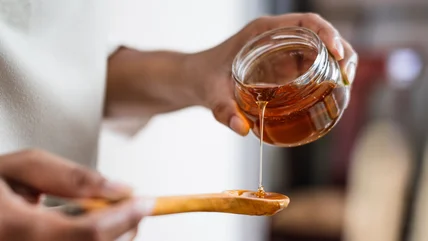Exercise is good for you; you’d find it difficult to locate any health professional who would tell you otherwise.
If the feel-good chemicals (endorphins) that get released in your body during a workout aren’t enough to increase your motivation to exercise, there are science-backed benefits like weight control, prevention of chronic disease, and better quality of sleep to consider.
Even so, on some days, you can feel a slump coming on before it’s time to hit the gym or go outside for your run. A long day at work or a particularly lazy weekend spent doing nothing can make you feel lethargic. This is why pre-workout snacks and drinks were invented, to give you that boost of energy to get you through your scheduled workout for the day. Popular pre-workout powders aside, sometimes you can turn to what’s right in your pantry, like honey. It could even be a good alternative for those who’ve experienced side effects from pre-workout drinks.
Honey has a host of health benefits attached to it, like preventing memory disorders, reducing your risk of heart disease, and promoting wound heading. Its anti-inflammatory, antioxidant, and antibacterial properties also make it an immune-boosting food. As a pre-workout, honey can give you that surge of energy to get you through a workout. Here’s how that happens.
Honey as pre-workout: How does it work?
About 80-85% of honey is comprised of carbohydrates (primarily fructose and glucose). Fructose and glucose are simple carbs, and these naturally occurring sugars are what give honey its energy-boosting properties.
“Honey is a simple carb that is quickly digested and absorbed into the bloodstream. Eating simple carbs before an endurance workout offers a quick energy boost,” explained New York City-based Dietitian Natalie Rizzo (via Today). Since it takes only 15 minutes for honey to be absorbed into your system, it’s a perfect snack to have a few minutes before exercise.
The studies looking at honey as an effective pre-workout, however, are nuanced, to say the least. For example, according to a 2019 study published in the International Journal of Sports Science, honey was found to significantly reduce fatigue in 1,500-meter runners but didn’t have an effect on their performance. A 2018 systematic review published in Science and Sports linked honey to possible improvement of aerobic exercise performance. A 2019 systematic review of nine studies found that honey compared similarly to other carbohydrate sources in terms of effect on exercise performance, perceptions of fatigue, blood glucose concentrations, and immunological responses. However, the study also noted that when honey is consumed over multiple weeks, it could weaken immunity-related concerns typically linked to moderate-to-intense exercise. The research also pointed toward honey’s positive effect on your cognitive capabilities, which could help with focus during a workout. There’s also research that’s looked at honey’s rehydration properties, which may help during exercise. After all, honey contains some amount of water, too.
Consuming honey before exercise: Things to think about
Not all honey is made the same. How the honey is sourced can alter its glycemic index (GI), the rate at which it spikes your blood sugar levels. While higher GI honeys may give you a more instant energy spike, they would also come with a rapid decrease in energy levels, which is not what you want during exercise. You could consume honey in intervals, but this is probably not the best idea unless you’re doing a really strenuous and long workout. Overconsumption of honey is linked with weight gain and diabetes. If you’re watching your blood sugar, check with your doctor before consuming this food before exercise.
“Honey has a glycemic index of around 50 to 60, depending on the type … The lower glycemic index of honey is due to fructose, which is absorbed more slowly by the body than glucose …,” explained Registered Dietician Nutritionist Victoria Whittington, per Signos. Raw honey, for example, which is unprocessed, has a lower GI. So does dark-hued buckwheat honey, citrus honey, thyme honey, Manuka honey, and acacia honey. If you want a slower release of energy and slower crash, you may want to opt for one of these. Although rare, a bee pollen allergy can be a concern for some.
When and how much you consume also matters. About two tablespoons of honey 30 to 60 minutes before exercise is what Natalie Rizzo suggested (via Today). Incidentally, this is close to the recommended intake of honey per day. On a different note, there are foods you should never eat before a workout. Might be worth checking those out, too.
Health Digest



















































































